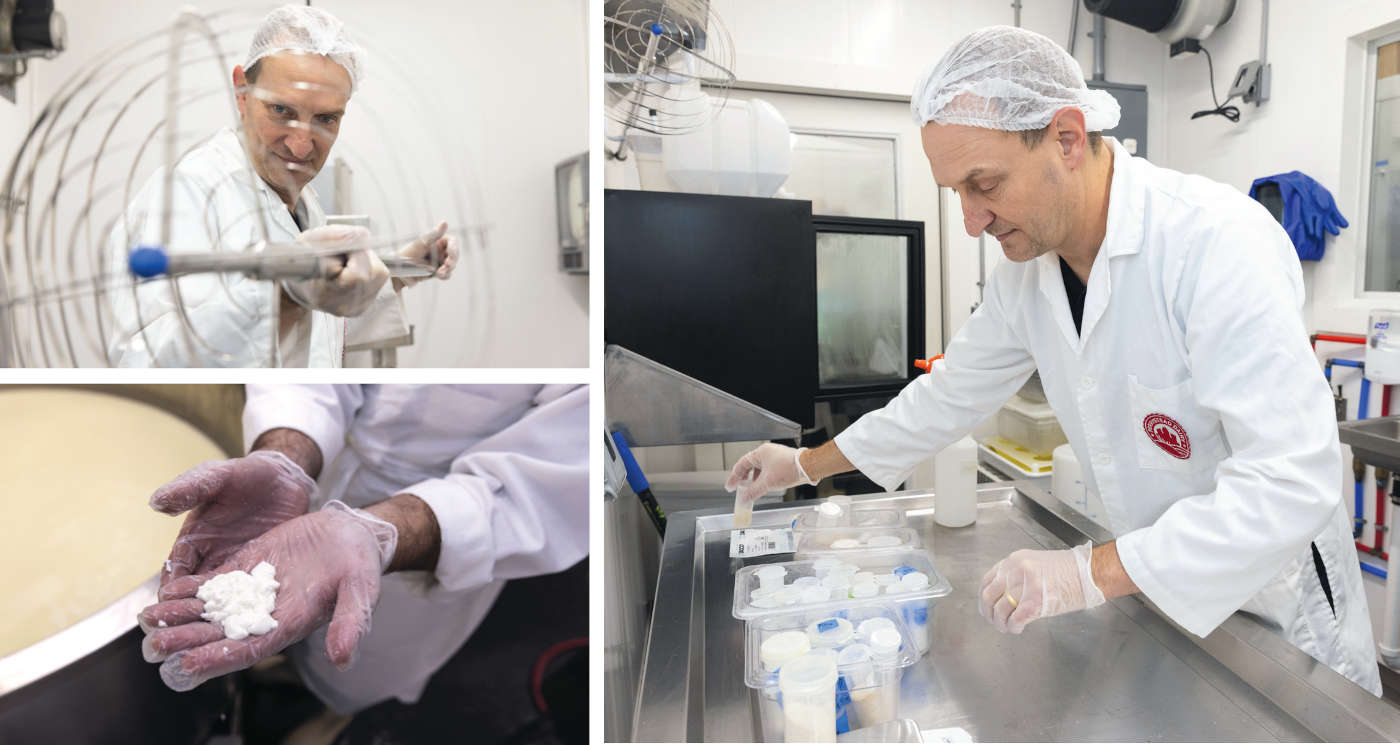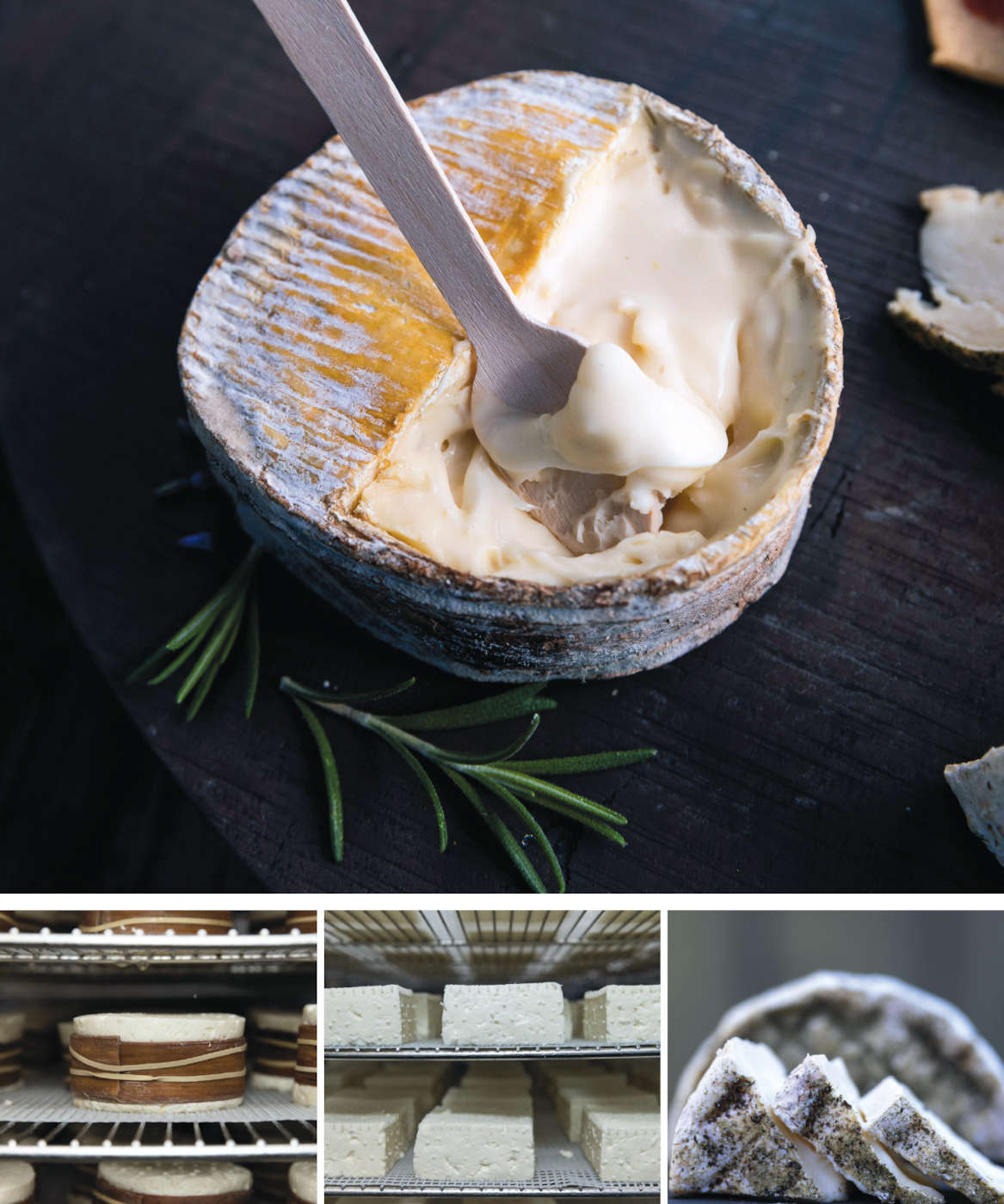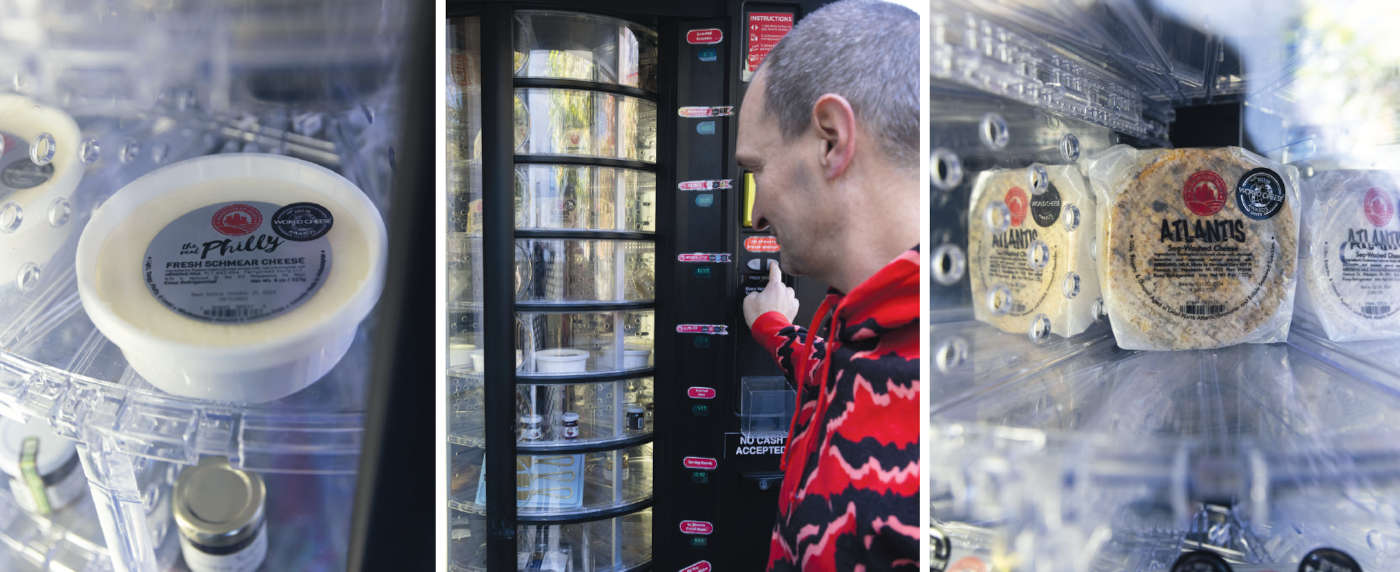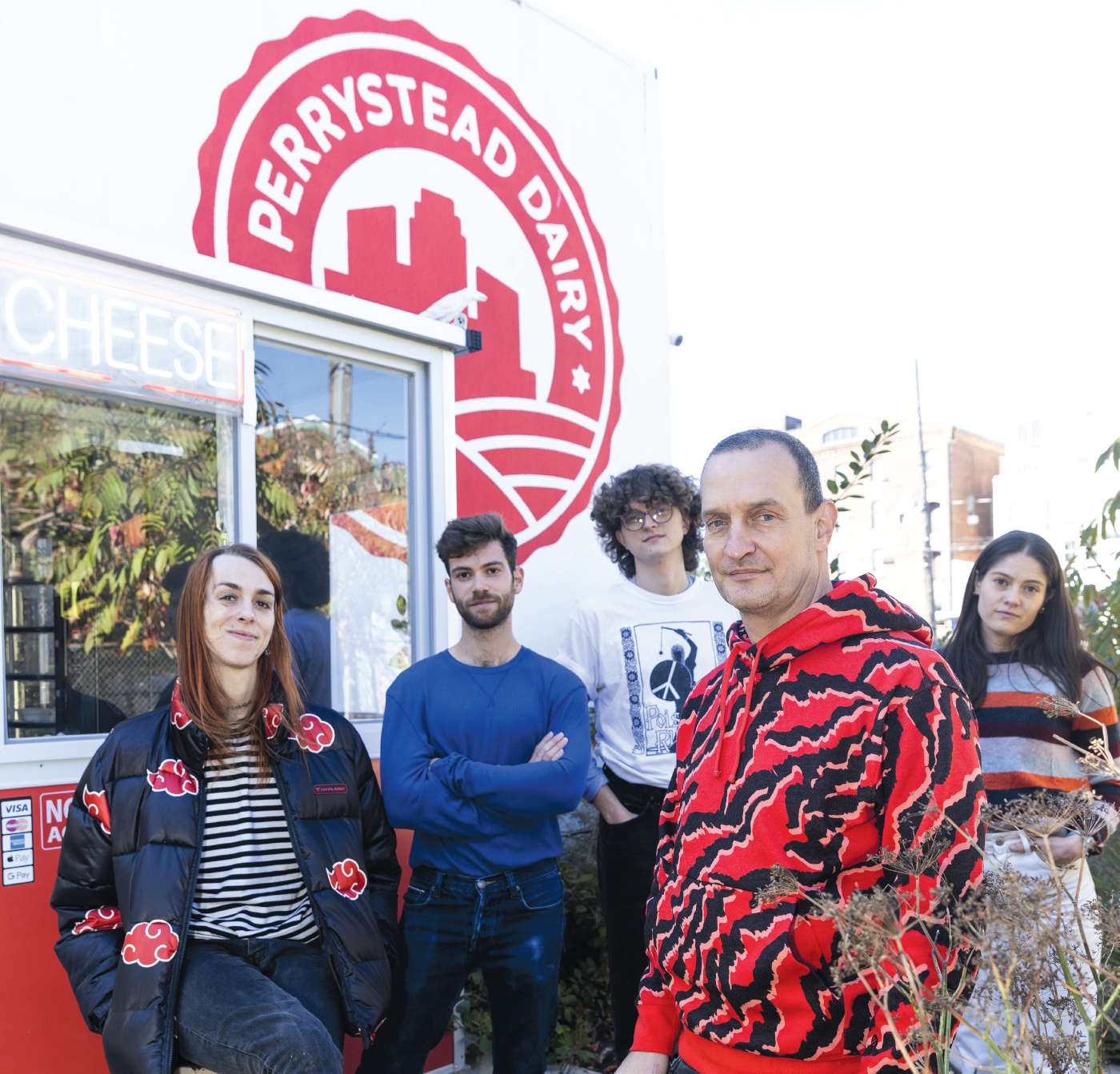Yoav Perry of Philadelphia’s Perrystead Dairy Knows Cheese Will Change The World
WHEN I THINK OF CHEESEMAKING, the image that comes to mind is pastoral: cows grazing on rolling green hills. Driving to Perrystead Dairy, in North Philadelphia’s Olde Kensington neighborhood at the corner of Cecil B. Moore and Hancock Street, is the opposite experience. It’s flanked by narrow streets lined with row homes and former factories.
Outside the dairy, Yoav Perry, Perrystead’s owner and head cheesemaker, teamed up with an expert at transforming urban decay into pollinator spaces to grow a Mediterranean-inspired garden that reminds him of where he grew up in Israel. There are sumac trees, garden sage, tiny beach plums, and cardoon thistle. That last plant is especially meaningful. Perry uses thistle rennet to make cheese. You can smell the French lavender as you walk by.
Beside the garden is Perrystead’s famous cheese vending machine, which opened earlier this year to a cacophony of excited press. “People kept knocking on our door, asking to buy cheese,” Perry says.
Perrystead doesn’t have a retail license, but he wanted neighbors to be able to enjoy his cheese without journeying to Whole Foods Market or Di Bruno Bros. So, Perry repurposed a sandwich vending machine and built a small booth around it. Now visitors can buy a little cube of fluffy Intergalactic or a tub of Real Philly Schmear 24/7, plus jams and La Quercia prosciutto to enjoy alongside.
The dispensary sparked something in the popular imagination— it appeared on the front page of the Wall Street Journal and garnered stories in Travel + Leisure and Food & Wine. Indeed, it’s nifty.
But behind the novelty is an ingenious cheesemaker changing the landscape of how cheese is created.

THE CHAIN OF GOODNESS
Perry is on a self-described “obsessive pursuit to define American original cheese.” He’s working to create a whole new model that supports rural and urban communities. His strategy is to pay fair wages for sustainably made milk and bring cheesemaking to the city he calls home. Philadelphia is a place where people need jobs, Perry explains.
His neighborhood, right on the Kensington/Fishtown border, is a “creative, great place to be,” according to Perry. “The things that make Philly dicey make it a great opportunity. Perrystead’s neighbors include Stateside Vodka, New Liberty Distillery, Punch Buggy Brewing Company, and the studio of Mike Geno, an artist whose paintings often depict cheese and other foods.
Perry is also deeply invested in supporting Pennsylvania dairy farmers, who are hurting. Since 2017, the state’s total number of farms decreased by 8 percent, according to data from Penn State. “Pennsylvania was the fourth-largest producer of milk in 2012, now it’s the eighth,” Perry says. Adding value—like by turning it into yogurt or cheese—means farmers can charge a premium for their milk.
“Our premise is to give responsible farmers extremely high value for their milk,” says Perry. He partners with two PA family farms that he’s chosen for their regenerative practices, rotational grazing, and intentional animal husbandry.
When the milk arrives, he’s ready to transform it into cheese, like a composer writing a symphony. The cheese is made in a shipping container that’s snugly fit into a 150-year-old building which was most recently a musical instrument repair shop.

Perry is on a self-described “obsessive pursuit to define American original cheese.” He’s working to create a whole new model that supports rural and urban communities.
It’s important to Perry to make cheese inside city limits, in a place that needs this kind of economic development. It also energizes him to be near all the talented people in Perrystead’s orbit—the package designers, cheesemakers, accountants, chefs, and ultimately the cheese lovers who buy and love his products.
When I ask Perry why he blends some 120 different cultures (the good bacteria that turn milk into cheese), he had a few different answers. “I like to make things difficult,” he says. “Plus, I’m a good mixologist, and each culture contributes to the flavor, texture, and presentation of the cheese. It’s like painting.”
Also: “I’m making American original cheese, not the same old, same old. I didn’t come here for karaoke—how much can we sing ‘Don’t Stop Believing?’” Perry’s cheeses are brand new compositions. No karaoke here.
With this system everyone benefits: the land, animals, farmers, makers, local community, the distributors and merchants, and the consumer. Perry calls it “the chain of goodness.” Sure, cheese can be wildly delicious. He thinks it can also change the world.

TRUE PHILLY ORIGINALS
Before Perry made cheese, he worked in design for the tech industry. The link between that career and his new one is innovation. Perrystead’s raison d'être is creating something truly new. Perry started making yogurt and labneh in his kitchen at home, then built a business selling cheese cultures and equipment to makers around the world, before launching Perrystead.
“Cheese has always been a product of its natural environment and human circumstances,” he says. His cheese reflects this time, place, and spirit.
Take Intergalactic, Perrystead’s signature cheese. Perry starts with fresh, sweet Pennsylvania cow’s milk. It then gets coagulated with Portuguese cardoon thistle, a relative of the artichoke, a tradition that dates to the Roman Empire. This sets it apart from most cheeses, made with a standard animal or microbial rennet.
“We coagulate it like Loire Valley goat’s milk, and we age it like it’s an alpine Robiola,” says Perry. In other words, it’s not karaoke, not even close. Its name is a combination of “interdisciplinary” and “lactic,” plus a nod to its out-of-this-world deliciousness level.
Beneath Intergalactic’s brainy-looking rind, the cube-shaped, snow-white cheese is somehow both dense and fluffy. It tastes of rich cream, fragrant herbs, and green olives. It’s even better with potato chips and sour cherry jam.
Also in Perrystead’s lineup is The Real Philly Schmear, which is not technically cream cheese because Perry skips the addition of cream. It doesn’t have the requisite 33 percent fat content to qualify. But it still has a luxurious richness with a whipped cream texture.
The Real Philly Schmear’s tangy flavor highlights the sweetness of grass-fed milk. It’s very welcome on an everything bagel, or a sourdough cracker, or drizzled with wildflower honey on a cheese board. It’s also made with nothing but cultured whole milk, a natural enzyme, and salt (no gums or additives).
Perry is always working on some new project—usually several. When I visited, I met Perry’s right-hand-cheesemaker, Jake Heller, a Main Line native and the champion of last year’s Cheesemonger Invitational. The team was installing a new pasteurizer—about three times the size of the old one—and troubleshooting a leaky valve. (They fixed it.) I got to taste a new cheese they were aging atop sprigs of rosemary from their garden. It tasted of buttercream and roasting hazelnuts.
The next day, Perry would be traveling to New York City to celebrate the launch of Treehug, their seasonal, spruce-wrapped wheel that’s spoonably lush, with a beefy, mushroomy umami.
Perry is rolling out new packaging for The Real Philly Schmear, and he has big plans: to be in every single market in the country. “We have to grow,” he says. “To support more farmers, to employ more people, and have more happy consumers.”





